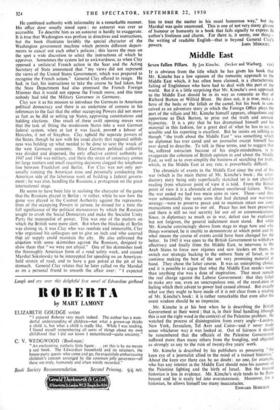Middle East
Seven Fallen Pillars. By Jon Kimche. (Seeker and Warburg. r Es.)
IT is obvious from the title which he has given his book that Mr. Kimche has a low opinion of the romantic approach to the Middle East which, it has often been claimed, is a characteristic failing of Englishmen who have had to deal with this part of the world. But it is a little surprising that Mr. Kimche's own approach to the Middle East should be in its way as romantic as that of Richard Burton or Wilfrid Blunt. He does not, it is true, make a hero of the bedu or the fellah or the camel, biit his book is con- ceived as an adventure story in which the Foreign Office plays the part of the villain and Mr. Kimche himself appears, ubiquitous and opportune as Dick Barton, to prise out the truth and unmask hypocrisy. It is a pity that he has dramatised himself and his material in this fashion, for a great deal of what he has to say is sensible and his reporting is excellent. But he insists on talking as though " the truth about the Middle East " was something which no diplomat has ever cared and no journalist except himself has ever dared to describe. To talk in these terms, and to suggest that hem suffered ostracism because of his single-mindedness, is to exaggerate the cohesion of British opinion in and about the Middle East, as well as to over-simplify the business of searching for truth, which, in the Middle East at any rate, is proverbially difficult.
The chronicle of events in the Middle East since the end of the war (which is the main theme of Mr. Kimche's book ; the intro- ductory story being only superficially sketched in) is not cheerful reading from whatever point of view it is told. From the British point of view it is a chronicle of almost unrelieved failure. When the war ended we had two main aims in view. These—and they were substantially the same aims that had dictated our war-time strategy—were to preserve peace and to maintain intact our com- munications and access to our oil. Peace has not been preserved and there is still no real security for our oil or communications. Since, in diplomacy as much as-in war, defeat can be explained but not forgiven, the general indictment must stand. But while Mr. Kimche convincingly shows from stage-to stage how and why things worsened, he is unable to demonstrate at which point and by what means the course of events could have been changed for the better. In 1945 it was open to the British Government to withdraw effectively and finally from the Middle East, to intervene in the Arab States to force new regimes and new leaders on them, to switch our strategic backing to the unborn State of Israel, or to continue making the best of the not very promising material at hand. They chose the latter course. It was an uninspiring choice, and it is possible to argue that what the Middle East neede.-i more than anything else was a dose of inspiration. That must remain the real charge against- the Labour Government: that they failed to make any use, even an unscrupulous one, of the revoldtion in feeling which their advent to power had caused abroad. But exactly what use they ought to have made of it is not clear from a reading of Mr. Kimche's book: it is rather remarkable that even after the event wisdom should be so imprecise.
Mr. Kimche is at his best when he is describing the British Government at their worst ; that is, in their final handling (though this is not the right word in the context) of the Palestine problem. He watched the process of disintegration from every angle—London, New York, Jerusalem, Tel Aviv and Cairo—and i* never made sense whichever way it was looked at. Out of fairness it should be remembered that the officials of the Palestine Government suffered more than many others from the bungling, and objected as strongly as any to the ruin of twenty-five years' work.
Mr. Kimche is described by his publishers as possessing " the keen eye of a journalist allied to the mind of a trained historian." About the keen eye there can be no doubt: no one, for example, who has any interest in the Middle East should miss his account of the Palestine fighting and the birth of Israel. But the trained historian is less in evidence. ‘Mr. Kimche's style tends to be flam- boyant and he is easily led into overstatement. Moreover, for a historian, he allows himself too many inaccuracies.•
EDWARD HODGKIN






































 Previous page
Previous page